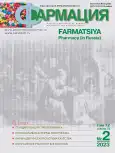Technological studies of intranasal dosage forms with ginkgo biloba phytocomplex and the possibility of their standardization
- Authors: Kovtun E.V.1, Bokov D.O.2,3, Samoryadova A.B.1, Chiriapkin A.S.1, Petrova A.L.1
-
Affiliations:
- Рyatigorsk Medical and Pharmaceutical Institute-branch of the Federal State Budgetary Educational Institution of the Ministry of Health of the Russian Federation
- Sechenov First Moscow State Medical University (Sechenov University)
- Federal State Budgetary Scientific Institution “Federal Research Center of Nutrition and Biotechnology”
- Issue: Vol 72, No 2 (2023)
- Pages: 28-33
- Section: Technology of medicines
- URL: https://journal-vniispk.ru/0367-3014/article/view/143145
- DOI: https://doi.org/10.29296/25419218-2023-02-05
- ID: 143145
Cite item
Abstract
Introduction. The second decade of the 21st century is filled with significant pharmaceutical science and manufacturing events, since it is in this period, a new concept began to be implemented, linking all the stages pharmaceutical development into a single continuous chain, from theoretical calculations, pharmacological tests, design composition of dosage forms up to the stage of implementation of innovative medicines. In parallel, society has faced new challenges, such as a pandemic, climate change and environmental pollution, which have a significant impact on people's health. These circumstances affected the domestic pharmaceutical industry and required an urgent and large-scale expansion of the range of dosage forms, including import substitution. This also applies to the rational use of natural resources, especially medicinal plants, the raw material base and the range of which is very voluminous. Intranasal dosage forms today make up a significant percentage of innovative dosage forms, although it is not yet possible to draw conclusions about their comprehensive study. First of all, this applies to phytocompositions for intranasal administration. This direction certainly needs detailed and versatile study.
Objective: technological research intranasal dosage forms, including the development of technology, as well as their standardization by one indicator.
Material and methods. When creating intranasal dosage forms on Based on the phytocomposition, as well as their standardization, various research methods were used: technological, biopharmaceutical, physical, physicochemical. Results. Quality standards for intranasal dosage forms have been developed. Methods for determining the active substances in intranasal gel and drops, the amount of flavonoids in terms of the major component are proposed.
Conclusion. Conducted studies prove the feasibility development of technology for dosage forms and assessment of their quality by the amount of flavonoids.
Full Text
##article.viewOnOriginalSite##About the authors
Elena V. Kovtun
Рyatigorsk Medical and Pharmaceutical Institute-branch of the Federal State Budgetary Educational Institution of the Ministry of Health of the Russian Federation
Email: elena.f.73@mail.ru
ORCID iD: 0000-0003-3437-760X
PhD in pharmaceutical sciences, associate professor of the Department of Pharmaceutical Technology with a Course in Medical Biotechnology
Russian Federation, Kalinin Avenue, 11, Pyatigorsk, 357532Dmitry O. Bokov
Sechenov First Moscow State Medical University (Sechenov University); Federal State Budgetary Scientific Institution “Federal Research Center of Nutrition and Biotechnology”
Email: bokov_d_o@staff.sechenov.ru
ORCID iD: 0000-0003-2968-2466
PhD in pharmaceutical sciences, associate professor, associate professor of the Pharmaceutical Natural Sciences Department
Russian Federation, st. Trubetskaya, 8, bldg. 2, Moscow, 119991; Ustinsky proezd, building 2/14, Moscow, 109240Anna B. Samoryadova
Рyatigorsk Medical and Pharmaceutical Institute-branch of the Federal State Budgetary Educational Institution of the Ministry of Health of the Russian Federation
Author for correspondence.
Email: elena.f.73@mail.ru
Candidate of Pharmaceutical Sciences, Associate Professor, Department of Pharmaceutical and Toxicological Chemistry
Russian Federation, Kalinin Avenue, 11, Pyatigorsk, 357532Alexey S. Chiriapkin
Рyatigorsk Medical and Pharmaceutical Institute-branch of the Federal State Budgetary Educational Institution of the Ministry of Health of the Russian Federation
Email: alexey.chiriapkin@yandex.ru
ORCID iD: 0000-0001-8207-2953
Lecturer of the Department of Pharmaceutical Chemistry
Russian Federation, Kalinin Avenue, 11, Pyatigorsk, 357532Alla L. Petrova
Рyatigorsk Medical and Pharmaceutical Institute-branch of the Federal State Budgetary Educational Institution of the Ministry of Health of the Russian Federation
Email: alla.petrova.99@mail.ru
ORCID iD: 0000-0002-6255-0601
PhD student of the Department of Pharmaceutical Chemistry
Russian Federation, Kalinin Avenue, 11, Pyatigorsk, 357532References
- Kadykov A.S., Shakhparonova N.V., Grishina D.A. The role of bilobil in the treatment of patients with cerebrovascular diseases. Russian medical J. 2008; 16 (26): 1736–8 (in Russian).
- Intranasal drug administration – an attractive delivery route for some drugs. Degenhard Marx, Gerallt Williams and Matthias Birkhoff. 2015. doi: 10.5772/59468
- Kurkin V.A., Bulankin D.G., Daeva E.D. Flavonoids of the leaves of ginkgo biloba (Ginkgo biloba L.). Chemistry of plant raw materials. 2012; 2: 85–8.
- Marks D., Birkhoff M., Williams G. Intranasal drug administration – an interesting past and a wonderful future Pharmaceutical technology and packaging. 2015; 5: 70–7 (in Russian).
- Bariev E.A., Lyapunov N.A., Bardakov A.I. Substantiation of the prospects for the development of an intranasal dosage form of naloxone for the treatment of opioid overdose. Electronic scientific and educational bulletin health and education in XXI. 2017; 19 (3): 9–10 (in Russian).
- Grigoryan E.R., Parfeinikov S.A., Koshel M.S. Methodological approach to the study of domestic drugs based on medicinal plant raw materials. Actual problems of pharmaceutical science and practice: materials of the International Scientific and Practical Conference. Vladikavkaz, 2014; 188–91 (in Russian).
- Bogoyavlensky A.P. et al. Actual problems of standardization of phytopreparations and plant raw materials for their production. Fundamental research. 2013; 6 (5): 1184–7 (in Russian).
- Line L.Z., Chen P., Ozkan M., Hartley J. M. Chromatographic profiles and identification of new phenolic components of ginkgo biloba leaves and individual products. J. Agric. Food chemistry. 2008; 13 (56 (15)0: 6671–9.
Supplementary files








